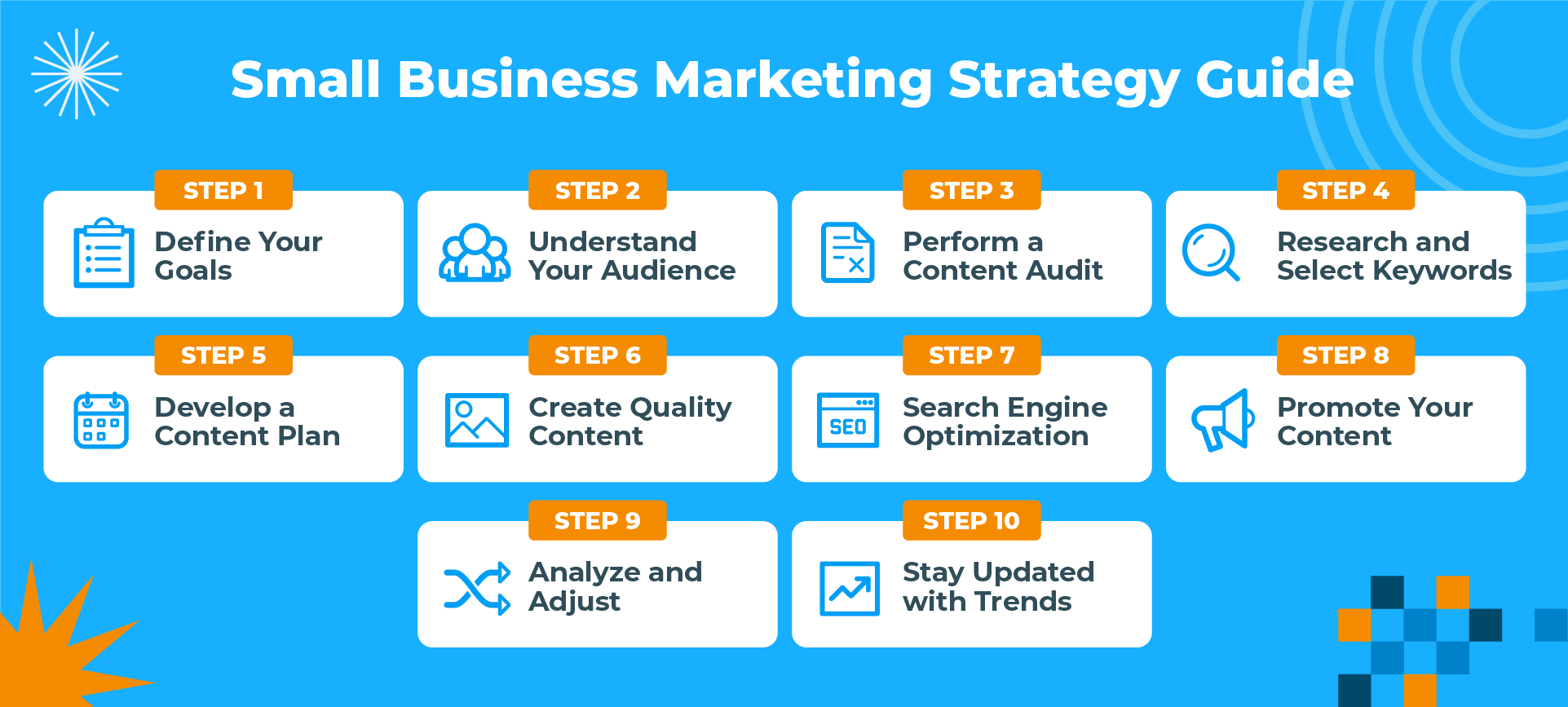In the dynamic landscape of 2024, understanding how to create a marketing strategy for a small business is crucial for success. Content marketing remains a powerful tool for engaging audiences, building brand authority, and driving sales. This guide will walk you through the essential steps to create a robust content marketing strategy tailored to your small business.

1. Define Your Goals
Every successful marketing strategy starts with clear, measurable goals. Identify what you want to achieve with your content marketing. Common goals include:
- Increasing brand awareness
- Driving website traffic
- Generating leads
- Boosting sales
- Enhancing customer engagement
- Align these goals with your overall business objectives to ensure your efforts contribute to your growth.
2. Understand Your Audience
Knowing your target audience is critical to creating relevant and engaging content. Develop detailed buyer personas that encompass:
- Demographics (age, gender, location, income, etc.)
- Psychographics (interests, values, lifestyle)
- Pain points and challenges
- Preferred content formats (blogs, videos, infographics, etc.)
- Conduct surveys, analyze website analytics, and engage with your audience on social media to gather insights.
3. Perform a Content Audit
Before you create new content, assess your existing materials. A content audit helps identify what’s working, what needs improvement, and what can be repurposed. Check:
- Performance metrics (traffic, engagement, conversions)
- SEO effectiveness (keywords, backlinks, page rankings)
- Relevance and accuracy
- Tools like Google Analytics and SEMrush can be used to streamline this process.
4. Research and Select Keywords
5. Develop a Content Plan
With your goals, audience, and keywords in mind, create a comprehensive content plan. This plan should include:
- Content types (blogs, videos, podcasts, etc.)
- Topics and themes
- Publishing schedule
- Distribution channels (website, social media, email newsletters)
- A content calendar can help you organize and stay consistent with your publishing schedule.
6. Create High-Quality Content
Quality trumps quantity in content marketing. Ensure your content is:
- Valuable and informative
- Well-researched and accurate
- Engaging and easy to read
- Optimized for SEO (keywords, meta tags, internal linking)
- Use a mix of formats to cater to different preferences. Incorporate visuals, such as images, infographics, and videos to enhance engagement
7. Optimize for Search Engines
SEO optimization increases the visibility of your content. Focus on:
- On-page SEO: Optimize titles, headers, meta descriptions, and URLs. Use keywords naturally and avoid keyword stuffing.
- Off-page SEO: Build backlinks from reputable sites. Engage in guest blogging and influencer partnerships.
- Technical SEO: Ensure your website is mobile-friendly, has fast loading times, and uses an SSL certificate.
8. Promote Your Content
Creating content is only half the battle; promoting it is equally important. Share your content across various channels:
- Social media platforms
- Email newsletters
- Online communities and forums
- Paid advertising (PPC, social media ads)
- Leverage your network to amplify reach. Encourage sharing and engagement to boost visibility.
9. Analyze and Adjust
- Traffic and engagement metrics
- Conversion rates
- SEO performance
- Social media metrics
- Adjust your strategy based on these insights to continuously improve and achieve your goals.

10. Stay Updated with Trends
The digital landscape evolves rapidly. Stay informed about the latest trends and best practices in content marketing. Attend webinars, read industry blogs, and participate in online communities to keep your strategy fresh and compelling.
Creating a marketing strategy for a small business in 2024 involves a thoughtful approach to content marketing. You can build a strong online presence and drive meaningful results by defining your goals, understanding your audience, and consistently delivering high-quality, optimized content. Follow this guide to craft a content marketing strategy that propels your small business to new heights.
Need help with your small business’s content marketing strategy? Let us help! Contact us today to get started!












